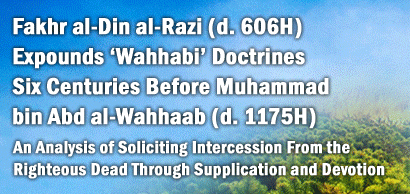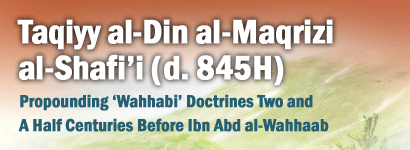 |
You are here:
Home  Misconceptions
Misconceptions
 Taqlid and Madhhabs Taqlid and Madhhabs
The son of Shaykh Muhammad bin Abd al-Wahhaab, Abd Allaah, explains in one of his letters after 1218H (see al-Durar al-Saniyyah 1/277) the position of the Shaykhs of the da'wah towards fiqh, ijtihaad, madhhabs, taqlid and the four Imaams:
ونحن أيضاً : في الفروع، على مذهب الإمام أحمد بن حنبل، ولا ننكر على من قلد أحد الأئمة الأربعة، دون غيرهم، لعدم ضبط مذاهب الغير ؛ الرافضة، والزيدية، والإمامية، ونحوهم ؛ ولا نقرهم ظاهراً على شيء من مذاهبهم الفاسدة، بل نجبرهم على تقليد أحد الأئمة الأربعة . ولا نستحق مرتبة الاجتهاد المطلق، ولا أحد لدينا يدعيها، إلا أننا في بعض المسائل، إذا صح لنا نص جلي، من كتاب، أو سنة غير منسوخ، ولا مخصص، ولا معارض بأقوى منه، وقال به أحد الأئمة الأربعة : أخذنا به، وتركنا المذهب، كارث الجد والأخوة، فإنا نقدم الجد بالإرث، وإن خالف مذهب الحنابلة .
ولا نفتش على أحد في مذهبه، ولا نعترض عليه، إلا إذا اطلعنا على نص جلي، مخالفاً لمذهب أحد الأئمة ، وكانت المسألة مما يحصل بها شعار ظاهر، كإمام الصلاة، فنأمر الحنفي، والمالكي مثلاً، بالمحافظة على نحو الطمأنينة في الاعتدال، والجلوس بين السجدتين، لوضوح دليل ذلك ؛ بخلاف جهر الإمام الشافعي بالبسملة، فلا نأمره بالأسرار، وشتان ما بين المسألتين ؛ فإذا قوي الدليل : أرشدناهم بالنص، وإن خالف المذهب، وذلك يكون نادراً جداً، ولا مانع من الاجتهاد في بعض المسائل دون بعض، فلا مناقضة لعدم دعوى الإجتهاد، وقد سبق جمع من أئمة المذاهب الأربعة، إلى اختيارات لهم في بعض المسائل، مخالفين للمذهب، الملتزمين تقليد صاحبه .
 And also we are upon the madhhab of Imaam Ahmad bin Hanbal in the matters of jurisprudence, and we do not show rejection to the one who made taqleed of one of the four Imaams as opposed to those besides them (the four) because of the absence of precision in the madhhabs of the others, such as the Raafidah, the Zaydiyyah and the Imaamiyyah and their likes. And we do not make open affirmation for them (the Raafidah, Zaydiyyah and Imaamiyyah) upon anything of their corrupt madhhabs. Rather, we compel (the common folk) to make taqlid of one of the four Imaams. And also we are upon the madhhab of Imaam Ahmad bin Hanbal in the matters of jurisprudence, and we do not show rejection to the one who made taqleed of one of the four Imaams as opposed to those besides them (the four) because of the absence of precision in the madhhabs of the others, such as the Raafidah, the Zaydiyyah and the Imaamiyyah and their likes. And we do not make open affirmation for them (the Raafidah, Zaydiyyah and Imaamiyyah) upon anything of their corrupt madhhabs. Rather, we compel (the common folk) to make taqlid of one of the four Imaams.
And we do not deserve the status of absolute ijtihaad and there is none amongst us who lays claim to it, except that in some of the issues (of jurisprudence), when a plain, clear text from the Book, or a Sunnah unabrogated, unspecified and uncontradicted by what is stronger than it, and by which one of the four Imaams have spoken, we take it and we leave our madhhab, such as in the example of the inheritance of the grandfather and brethren. For we give precedence to the grandfather in the inheritance even though it opposes the madhhab of the Hanbalis.
And we do not investigate (scrutinize) anyone in his madhhab, nor do we find fault with him except when we come across a plain, clear text which opposes the madhhab of one of the four Imaams and it is a matter through which an open and apparent symbol (of religious duty) is actualized, such as (it pertains to) the Imaam leading the prayer, we order the Hanafi and the Maliki for example, to maintain perfect rest (calm, ease) when arising from ruku' and in sitting between the two prostrations because of the clarity of the evidence regarding that. [This being] different to the Shafi'ite Imaam (leading the prayer) who utters the basmalah loudly (in the prayer), we do not order to him to say it inwardly, and there is a great difference between the two issues (given here). So when the evidence is strong, we direct them (to what is correct) with the text, even if it opposes the madhhab, but this occurs very rarely.
And there is nothing to prevent making ijtihaad in some matters as opposed to others. Thus, there is no contradiction between (this and) not making the claim of independent ijtihaad, because a group from the scholars from the four madhhabs are preceded choosing certain preferred opinions in certain matters, who, whilst making taqleed of the founders of the madhhab (in general), opposed the madhhab (in those matters).
Notes
This is a very different picture to the one spread and presented by the extreme Sufis and others, who in their propaganda, spread the lies of the adversaries, and never ever do justice and present the actual statements of the so-called 'Wahhabis' from their own writings, statements, letters and treatises. So the position we gather from Shaykh Abd Allah bin Muhammad bin Abd al-Wahhaab is that they do not prohibit following a madhhab so long as there is no clash with a clear, plain legislative text which another Imaam (from the other three schools) has spoken with and which is in a non-obscure matter. He rejects claiming independent absolute ijtihaad and no one claimed that amongst them. However, this does not mean that in certain issues one may have preferred opinions that lie outside of one's madhhab. One can also see the wisdom used by these Scholars of Tawhid in the matters of correction.
Link to this article: Show:
HTML Link •
Full Link •
Short Link
Share or Bookmark this page: You will need to have an account with the selected service in order to post links or bookmark this page.







|
|
|
Add a Comment
You must be registered and logged in to comment.
|
 |




|
 |
 Misconceptions
Misconceptions
 Taqlid and Madhhabs
Taqlid and Madhhabs



 And also we are upon the madhhab of Imaam Ahmad bin Hanbal in the matters of jurisprudence, and we do not show rejection to the one who made taqleed of one of the four Imaams as opposed to those besides them (the four) because of the absence of precision in the madhhabs of the others, such as the
And also we are upon the madhhab of Imaam Ahmad bin Hanbal in the matters of jurisprudence, and we do not show rejection to the one who made taqleed of one of the four Imaams as opposed to those besides them (the four) because of the absence of precision in the madhhabs of the others, such as the 








